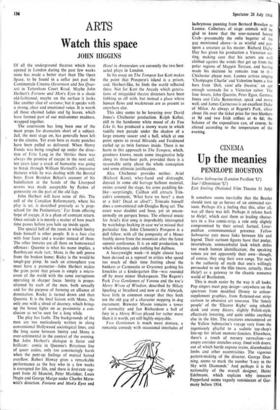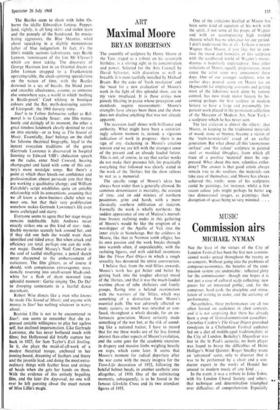CINEMA
Up the meanies
PENELOPE IIOUSTON
Exit Smiling (National Film Theatre 31 July) It somehow seems inevitable that the Beatles should turn up as heroes of an animated car- toon. Perhaps it's a feeling that this, -after all, was all there was left. Perhaps it relates back to Help!, which cast them as leading charac- ters in a live comic-strip, a role only slightly compromised by their actual, factual, Liver- pudlian commonsensical presence. Yellow Submarine cuts more links between life and legend. Their cartoon figures have that pudgy, invertebrate, somnambulist look which defies too much human identification; the speaking voices are not apparently their own—though, of course; they sing their own songs. Yet such is the authority of myth that one's willingly persuaded to see the film (more, actually, than Help!) as a gateway to the chaotic nonsense world of Beatledom.
This is made easier by the way it all looks. Pop singers meet pop design—anywhere on the spectrum from modified Disney to colour- supplement graphics, from flattened-out strip- cartoon to obsessive art nouveau. The 'lonely people' of the 'Eleanor Rigby' song inhabit dank and stony decors, slightly Polish-style, effectively lowering, and quite unlike anything else in the film. The creatures encountered on the Yellow Submarine's voyage vary from the ingeniously playful to a sadistic toy-shop's line-up for infant monster-fanciers. Elsewhere, there's a touch of nursery surrealism—an empty corridor stretches away, lined with doors, out of which hurtle express trains, disembodied limbs and other eccentricities. The vigorous pattern-making of the director, George Dun- ning, seems to mark the number 'Lucy in the Sky with Diamonds.' And perhaps it is the nationality of the overall designer, Heinz Edelmann, which explains why innocent Pepperland seems vaguely reminiscent of Ger- many before 1914. The Beatles seem to share with John Os- borne the idyllic Edwardian fantasy. Pepper- land, rightly, is all long skirts and stolen tears and the panoply of the bandstand. Its music- hating aggressors, the Blue Meanies, whirl about squeaking in a slightly monotonous lather of blue indignation. In fact, it's the film's middle sections (adventures, says Beatle Lennon, 'reminiscent of the late Mr Ulysses') which are most taking. The discovery of George Harrison lost in an Oriental dream or John Lennon strapped to a Frankenstein operating-table, the clock-spinning speculations on the nature of time, with the Beatles drowned in a sea of beards, the bland puns and anarchic allusiveness, assume, as someone else somewhere says, a world in which 'nothing is Beatle-proof.' Cool whimsy in boutique colours and the flat, myth-destroying accents of Liverpool: the 1968 nursery story.
Star! is to Yellow Submarine rather as Bal- moral is to Carnaby Street: one film tremu- lously and datingly of its moment, the other a great timeless landmark clearly destined to run on into eternity—or as long as The Sound of Music. Essentially, Star! belongs on the shelf for fulsome theatrical biography, loyal to the instant evocation traditions of the genre (Gertrude Lawrence is discovered in hospital listening to Edward VIII's abdication speech on the radio, enter Noel Coward, bearing champagne) and laced with some of this cen- tury's more nostalgic songs. But there's a point at which sheer knock-out confidence and professionalism almost persuade you that they are working a qualitative change; and William Fairchild's script establishes quite an amiable relationship with its conventions, assuming that we all know a show-business cliché when we meet one, but that their very proliferation somehow makes Gertrude Lawrence's life even more archetypal and starry.
Everyone seems to agree that her stage magic remains indefinable. Julie Andrews never exactly strikes one as this kind of star: inde- finable mysteries scarcely lurk around her, and if they did one feels she would want them identified and tidied away. But when attack and efficiency are total, perhaps one can do with- out magic. Daniel Massey's Noel Coward is the soul of tactful intelligence, a pencil sketch never sharpened to the embarrassment of caricature. The film glitters, as of course it should, with conspicuous extravagance, occa- sionally reversing into small-screen black-and- white for a flash of sham newsreel (one splendid moment: Gertie singing 'Do, Do Do' to drooping contestants in a fearful dance marathon).
Robert Wise directs like a man who knows he made The Sound of Music; and anyone with money in Star! has nothing whatever to worry about.
Beatrice Lillie is not to be encountered in Star!: one seems to remember that she ex- pressed amiable willingness to play her ageless self, but declined impersonation. Like Gertrude Lawrence, she has never bothered much with films; but Hollywood did briefly capture her back in 1927, for Sam Taylor's Exit Smiling. In it, she plays the maid-of-all-work of a modest theatrical troupe, anchored to her ironing-board, dreaming of feathers and finery and the juvenile lead, and doing the most extra- ordinary things with feather boas and strings of beads when she gets her hands on them. With the evidence of this entirely beguiling film, and the later On Approval, no one will ever be left guessing about the exact nature of Miss Lillie's magic.







































 Previous page
Previous page